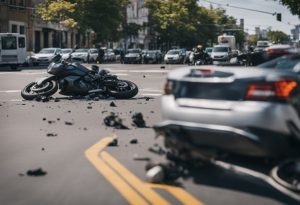When a motorcycle hits a car, the consequences can be severe due to the disparity in size and protection between the two vehicles. Motorcyclists face a higher risk of injury or fatality compared to occupants of the car. The car’s structure provides more protection, making physical harm to its occupants less likely.
Motorcycle collisions with cars often lead to significant damage to the motorcycle and can result in the rider being ejected from the bike. The severity of the accident can depend on various factors, such as the speed at impact, the angle of collision, and whether both parties were wearing protective gear. In such accidents, it’s not uncommon for traffic disruptions to occur, often requiring emergency services to manage the scene and provide care for any injuries.
Dynamics of a Motorcycle-Car Collision
In a collision between a motorcycle and a car, the dynamics involve various physical forces affecting both vehicles and significant risks to the motorcycle rider. These accidents often result from specific causes like visibility issues and road conditions.
Impact Forces and Rider Vulnerability
When a motorcycle hits a car, the rider is exposed to severe impact forces. Unlike car occupants, motorcyclists lack protective barriers like seat belts and airbags. The force of the collision can throw the rider from the motorcycle, resulting in injuries ranging from fractures to traumatic brain injuries.
Impact Forces:
- High-Speed Collisions: Greater force, higher injury risk.
- Low-Speed Collisions: Less force, but still dangerous due to lack of protection.
Rider Vulnerability:
- Lack of Enclosure: Exposes the body directly to impacts.
- Protective Gear: Helmets and jackets can reduce but not eliminate injuries.
Common Causes of Motorcycle vs. Car Accidents
Many motorcycle-car collisions are due to visibility issues and road conditions. Drivers often fail to see motorcyclists because of the motorcycle’s small size. Poor road conditions like wet surfaces and potholes can also contribute to accidents.
Visibility Issues:
- Blind Spots: Motorcycles are easily hidden in a car’s blind spots.
- Low Light Conditions: Dawn, dusk, or night driving reduces visibility.
Road Conditions:
- Wet Roads: Decrease tire grip, leading to skids.
- Potholes: Sudden obstacles can cause loss of control.
Legal Aspects of Motorcycle Accidents
When a motorcycle collides with a car, it raises critical legal concerns involving fault, liability, and specific laws governing such incidents in Colorado. The involvement of a skilled motorcycle accident lawyer can be crucial in navigating these complexities.
Determining Fault and Liability
In motorcycle accidents, determining who is at fault is essential. This process often involves gathering evidence from the accident scene, eyewitness accounts, and police reports. Both parties’ actions are analyzed to see who violated traffic laws or drove negligently.
Insurance companies conduct their investigations, but their goal is often to minimize payouts. In Colorado, the comparative negligence rule applies, meaning compensation can be reduced based on one’s share of fault.
Role of a Motorcycle Accident Lawyer
A motorcycle accident lawyer assists in multiple ways. They gather evidence, negotiate with insurance companies, and represent the injured party in court if necessary. These lawyers understand the nuances of motorcycle laws and can effectively argue on behalf of their clients.
In Colorado Springs, a specialized motorcycle accident lawyer can offer local expertise and a track record of handling similar cases. Their role includes ensuring that the injured party receives fair compensation for medical bills, lost wages, and other damages.
Motorcycle Laws and Statutes in Colorado
Colorado has specific laws that affect motorcycle riders. These include helmet laws, age restrictions, and requirements for motorcycle endorsements on a driver’s license. Riders under 18 must wear helmets, while adults are encouraged but not required to do so.
Additionally, statutes related to lane splitting, speed limits, and traffic signals are strictly enforced. Violating these can impact fault determination in an accident. Understanding local regulations can significantly influence the outcome of legal proceedings following a collision.
Immediate Actions After an Accident
After a motorcycle hits a car, it is crucial to act promptly. Ensure safety, perform first aid, and gather evidence for legal and insurance purposes.
Emergency Response and First Aid
Immediate safety is the first priority. Move to a safe location if possible to avoid further injury. Check for any injured individuals, including both motorcyclists and car occupants.
Call emergency services immediately, providing clear information such as the location, number of people injured, and the nature of their injuries. Administer first aid while waiting for emergency responders. Common first aid steps:
- Control bleeding using clean cloths or bandages
- Immobilize any suspected broken bones
- Keep the injured person calm and still
Gathering Evidence at the Scene
Gathering evidence at the scene is crucial for both insurance claims and legal actions. Start by taking photos of the accident scene, including vehicle positions, damages, and skid marks.
Exchange information with all involved parties. Collect details such as:
- Names and contact information
- License plate numbers
- Insurance details
If there are any witnesses, obtain their contact information and statements. Documenting weather and road conditions can also be beneficial. A well-documented scene helps in accurately determining the cause of the accident later.
Medical Considerations Following a Collision
Motorcycle accidents often result in severe injuries due to minimal protection for the rider. Understanding the common injuries and potential long-term health impacts can guide effective medical treatment and recovery planning.
Common Injuries from Motorcycle Accidents
Motorcyclists frequently face traumatic brain injuries (TBI), even when wearing helmets. TBIs can range from mild concussions to severe brain damage, requiring extensive medical care. Another common injury is road rash, caused by the skin scraping against the pavement, which can lead to infections.
Fractures, especially of the lower extremities like the legs and feet, are prevalent. Broken ribs and spinal injuries, including paralysis, also occur. Internal injuries, such as organ damage and internal bleeding, often demand immediate surgical intervention. Motorcyclists are at high risk for limb amputations due to severe fractures or soft tissue damage.
Long-Term Health Impacts
Individuals injured in a motorcycle accident may experience lasting health issues. Chronic pain, particularly from nerve damage or improper healing of fractures, is common. Post-traumatic stress disorder (PTSD) can also develop, alongside anxiety and depression, affecting the individual’s mental health.
Mobility issues may arise from injuries, requiring long-term physical therapy and, in severe cases, dependency on mobility aids. Cognitive impairments from TBIs can persist, impacting everyday functions like memory and concentration. Changes in lifestyle and employment status may occur due to the extent of disabilities, emphasizing the need for ongoing support and rehabilitation.
Insurance and Financial Implications
When a motorcycle hits a car, it can be a complex situation involving various insurance and financial considerations. The type and extent of coverage can become pivotal in determining who pays for damages and medical expenses.
Claims and Coverage for Motorcyclists
Motorcyclists involved in an accident may find their claims process to be quite different from those for car drivers. Collision coverage will usually cover the bike’s damages, while liability insurance typically covers damages or injuries caused to others. In some states, uninsured and underinsured motorist coverage can prove crucial if the at-fault driver lacks adequate insurance.
Motorcyclists injured in a motorcycle accident often face higher medical expenses. Consulting a Colorado Springs motorcycle accident lawyer might be advisable to navigate the complexities of insurance claims, especially when severe injuries or disputes over fault arise.
Navigating Insurance Negotiations
It’s common for insurers to attempt minimizing payout amounts, so understanding one’s policy specifics and potential compensatory avenues is essential.
Some key strategies for successful negotiations include:
- Documenting Everything: Photographs, police reports, and medical records can substantiate claims.
- Professional Advice: Employing a lawyer can strengthen one’s case, ensuring fair compensation.
Insurance companies often seek to settle claims expediently and for the least amount possible. Engaging a Colorado Springs motorcycle accident lawyer can provide the leverage needed to secure appropriate financial compensation for injuries and damages.












